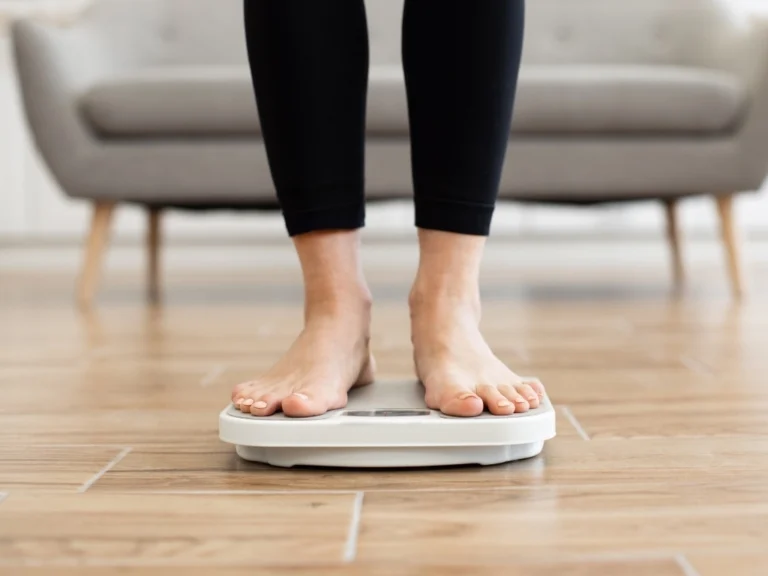Starting Zepbound can feel like a fresh start, but it’s common to question your progress when results seem slow. This doesn’t always signal a problem; Zepbound works best when dosage, timing, and daily habits align. With patience and a steady routine, you can set yourself up for sustainable results.
How does Zepbound work?
Zepbound (tirzepatide) belongs to a class of medications known as GLP-1/GIP receptor agonists. These drugs mimic two natural hormones that help regulate appetite and blood sugar. Here’s what that means for you:
- Slowed gastric emptying – Food stays in your stomach longer, which helps you feel fuller.
- Reduced appetite – Many people naturally eat less without feeling deprived.
- Improved insulin sensitivity – Better blood sugar control can help reduce fat storage.
Clinical research supports these effects. In the SURMOUNT-1 trial, participants taking tirzepatide lost an average of 15–21% of their body weight over 72 weeks, depending on the dose. That’s significant progress compared to other treatments available today.
Even with this promising research, it’s important to keep expectations realistic. Zepbound isn’t a “magic pill.” It’s a powerful tool that works best alongside a balanced diet, regular movement, and healthy sleep habits.

Why am I not losing weight on Zepbound?
It can be discouraging to see the scale stall, but plateaus and slower progress are part of almost every weight loss journey. Some common reasons include:
- Dosage may be too low – Doctors often start you on a smaller dose of Zepbound to minimize side effects, then gradually increase it. If you’re still on a low dose, you may not see full benefits yet.
- Lifestyle factors – Eating more calories than your body needs, skipping physical activity, or not getting enough sleep can slow results.
- Metabolic adaptation – Your body may adjust to a lower weight by burning fewer calories, creating a plateau.
- Medical factors – Conditions like thyroid disorders, PCOS, or certain medications can affect weight loss.
If you’ve been on Zepbound for several months and progress feels stuck, it’s worth reviewing your nutrition, movement, and sleep patterns. Keeping a food and activity journal can provide helpful insights. Talking with your provider about dosage adjustments or lab testing can also make a big difference. The Endocrine Society and other professional groups recommend regular check-ins to ensure you’re on the right track.
Why am I gaining weight on Zepbound?
Although uncommon, some people notice temporary weight gain after starting Zepbound. This doesn’t mean the medication isn’t working. A few possible explanations include:
- Water retention or constipation – Both can cause the scale to go up in the short term.
- Initial fluctuations – Your body may shift before settling into a consistent weight loss pattern.
- Changes in appetite control – As your body adjusts, you may eat more on some days without realizing it.
- Underlying health conditions – Insulin resistance, hormonal imbalances, or medications like steroids can affect results.
If you’re wondering, “Why am I gaining weight on Zepbound?”, don’t panic. Track your meals, water intake, and activity for a couple of weeks, and bring this information to your next appointment with your prescriber. Sometimes, small adjustments — like reducing sugary drinks or increasing protein — can help. If needed, your provider may evaluate other medical factors.
Zepbound dosage & best time of day to take it
Zepbound is used once weekly as a simple injection under the skin. Most people begin at a low dose (2.5 mg) and gradually increase every 4 weeks until they reach the dose their body tolerates best — often between 10 mg and 15 mg.
When it comes to the best time of day to take Zepbound, there isn’t a medically proven “ideal” time. What matters most is consistency. Pick a day and time that fits your routine so you don’t forget.
Some patients prefer mornings because they can monitor side effects throughout the day. Others find evenings easier since they can sleep through any mild nausea. You can choose whichever time feels most sustainable for you.
Practical tips:
- Set a weekly phone reminder.
- Pair your injection with an existing habit (like Sunday evening meal prep).
- Rotate injection sites (abdomen, thigh, or upper arm) to reduce irritation.
How much weight can you lose on Zepbound?
Weight loss with Zepbound varies from person to person, but clinical trials give us a helpful reference. In the SURMOUNT-1 study:
- At 72 weeks, participants lost an average of 15% of body weight at lower doses.
- At higher doses, the average loss reached about 21% of body weight.
To put that in perspective, someone starting at 220 pounds could expect to lose around 33–46 pounds, depending on dosage and lifestyle factors.
It’s important to remember that averages don’t tell the whole story. Some people lose more, while others lose less. Your diet, activity, sleep, and overall health all play a role. So if you’ve asked, “How much weight can I lose on Zepbound?”, the answer is: quite a bit, but your journey will be uniquely yours.
Thriving on Zepbound: Lifestyle tips for lasting results
Medication can open the door, but your daily habits help you walk through it. These tips can maximize results and keep you feeling your best:
- Focus on nutrition – Build meals around protein (chicken, fish, beans), fiber (vegetables, whole grains), and healthy fats (avocado, olive oil). These foods support satiety and preserve lean muscle.
- Move regularly – Strength training helps you maintain muscle mass, while cardio supports heart health and endurance. Aim for a mix of both.
- Prioritize sleep – Poor sleep disrupts appetite hormones and can make it harder to stay consistent. Most adults need 7–9 hours.
- Manage stress – Chronic stress can affect weight loss. Mindfulness, journaling, or light activity like yoga can help.
Think of Zepbound as one piece of a larger puzzle. When it’s paired with healthy habits and personalized nutrition counseling from a registered dietitian, it can become a powerful part of a sustainable weight loss plan and overall healthier lifestyle.

Take the next step with support that works for you
Zepbound can be a powerful tool for weight loss, but long-term results depend on more than the medication alone. If you’ve been wondering, “Why am I not losing weight on Zepbound?”, it doesn’t necessarily mean the treatment isn’t effective — it may just be time to refine your plan. Paying attention to nutrition, physical activity, sleep, and consistent dosing can make a real difference in how your body responds.
For a more guided approach, working with a registered weight loss dietitian at Health Loft can help you bridge the gap between medication and lifestyle. Through personalized nutrition counseling, you’ll learn how to build sustainable habits, support your metabolism, and navigate challenges as they come up. With the right plan — and the right support — you can move toward your goals with greater confidence and lasting results.
This article was reviewed by Adrienne DePaul, MS, RDN. It is intended for informational purposes only and does not replace personalized nutritional advice.













